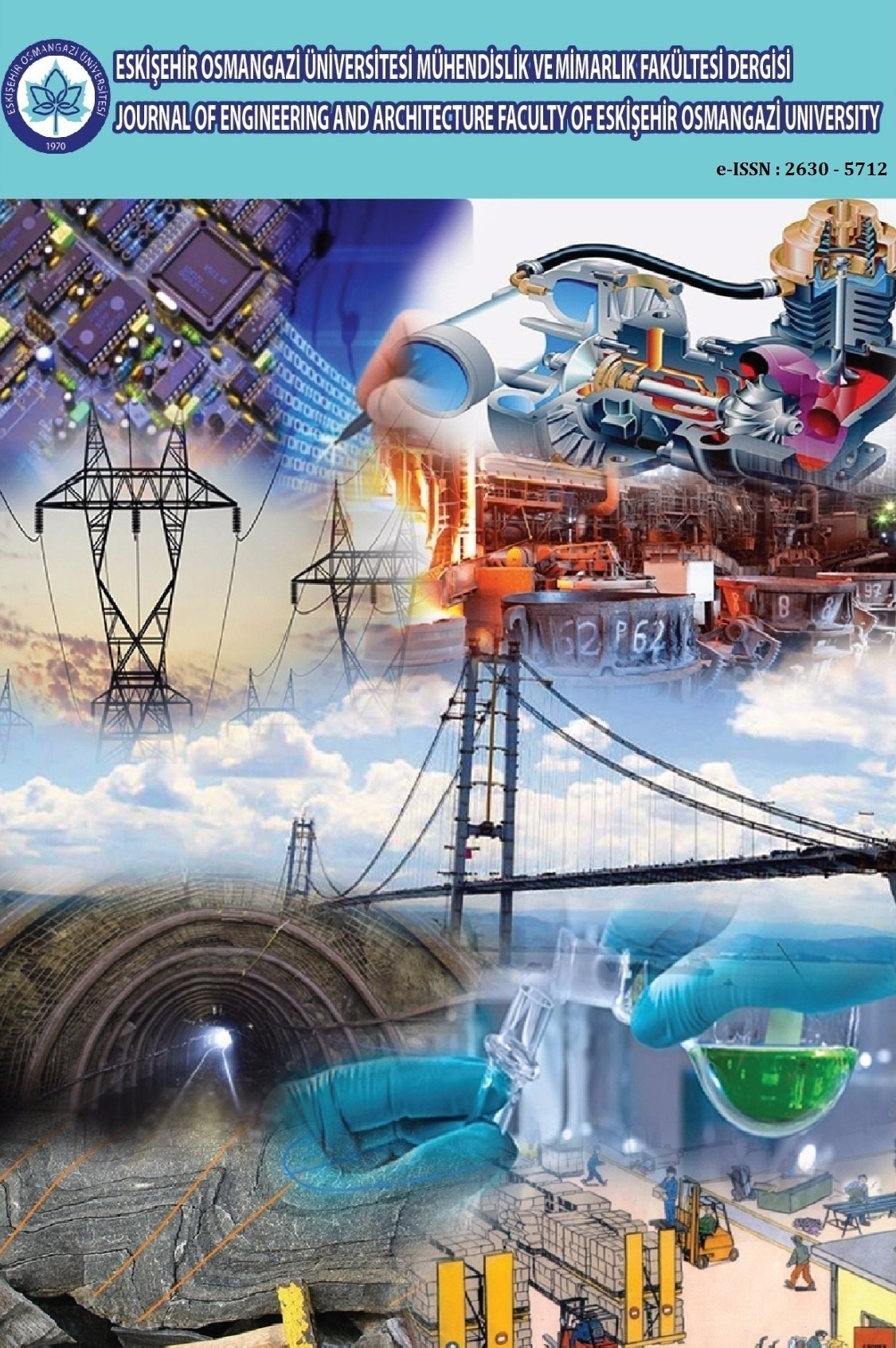Ferrocement Su Tanklarının Tasarımı Ve Yapımı
Ferrocement, su tankı, tasarım ve yapım .
Desıgn And Constructıon Of Ferrocement Water Tanks
Ferrocement, water tank,
___
- [1] UNIDO, “Boats from Ferrocement”, Utilization of Shipbuilding and Repair Facilities Series, No.1, United Nations, New York, 1972.
- [2] İ.B. Topçu, “Deprem Bölgeleri İçin Hafif Betonla Ferrocement Çadır Yapımı”, Osmangazi Üniversitesi, Müh.-Mim. Fak. Dergisi, Cilt XIII, Sayı 1, ss. 1-13, 2000.
- [3] B.R. Walkus, T.G. Kowalski, “Ferrocement: A Survey”, Concrete Cement-Concrete Association of London, pp. 48-52, February 1971.
- [4] P. Paramasivam, G.K. Nathan, S.L. Lee, “Influence of Discrete Fibres on Behaviour of Ferrocement”, Proc. of the Intern. Conf. on Low-Income housing Technology and Policy, pp.1095-1105, Bangkok, Thailand, June 7-10, 1977.
- [5] İ.B. Topçu, B. Işıkdağ, E. Abi, Ö. Tatar, “Yapıların Depreme Karşı Güçlendirilmesinde Kullanılan Ferrocement Panellerin Özellikleri”, Kocaeli Deprem Sempozyumu, Özler Kitabı, s.166, Kocaeli, 23-25 Mart 2005.
- [6] Large Ferrocement Water Tank-United Nations High Commissioner for Refugees (UNHCR ), pp. 10-11, July 2006.
- [7] Large Ferrocement Water Tank-United Nations High Commissioner for Refugees (UNHCR ), pp. 10-13, July 2006. Ferrocement Su Tanklarının Tasarımı ve Yapımı 13
- [8] Large Ferrocement Water Tank-United Nations High Commissioner for Refugees (UNHCR ), pp. 13-15, July 2006.
- [9] M.K. Hurd, “Ferrocement-Boatbuilding and Beyond”, Concrete Construction, p. 4, April 1977.
- [10] R.G. Morgan, “History of and Experience with Concrete Ships”, Proceedings of the Conference on Concrete Ships and Floating Structures, Berkeley, University of California, pp. 3-16, September 1975.
- [11] S.T. Erdoğan ve T.Y. Erdoğan, “Birinci Dünya Savaşı Yıllarında İlk Kez Yapılan Beton Gemiler”, Hazır Beton, THBB, ss. 54-56, Mayıs-Haziran 2006.
- [12] J.A. Campell, “American Beton Gemi İnşası”, Betonart, Beton ve Mimarlık Dergisi, TÇMB Yayınları, Sayı 4, ss. 79-85, 2004.
- [13] National Academy of Sciences, “Ferrocement Applications in Developing Countries”, A Report of an Ad Hoc Panel of the Advisory Committee on Technological Innovation, BOSTID, Washington, D.C., 1973.
- [14] Anon, “Hong Kong: Roslyn I-Ferrocement Trawler”, Fishing News International, p. 33, July 1971.
- [15] T. Özturan ve F. Kocataşkın, “Ferrocementin Konut Yapımında Kullanılma Olanakları”, Türkiye İnşaat Mühendisliği 5. Teknik Kongresi, Cilt 1, Ankara, 1987.
- [16] “Ferrocement Applications in Developing Countries”, A Report of an Ad Hoc Panel of the Advisory Committee on Technological Innovation, Board on Science and Technology for International Development, National Academy of Sciences, Washington DC, p. 90, 1973.
- [17] İ. Uslu, “Ferrocementin Zirai Amaçlı Yeni Kullanım Alanları”, Osmangazi Üniv., Fen Bil. Ens., s. 74, Eskişehir,Kasım 2001.
- [18] İ.B. Topçu, “Hafif Betonla Ferrocement Kano Yapımı”, X. Mühendislik Sempozyumu, İnşaat Mühendisliği’99, Süleyman Demirel Üniversitesi, ss. 351-359, Isparta,1999.
- [19] İ.B. Topçu, M. Canbaz ve A.R. Boğa, “Deprem Bölgelerinde Kullanılabilecek Ferrocement Çadırlar”, Kocaeli Deprem Sempozyumu, Özler Kitabı, s.167, Kocaeli, 23-25 Mart 2005.
- [20] İ.B. Topçu ve A. Uğurlu, “Tel Donatılı Örgülerle Güçlendirilmiş Önyapımlı Bir Beton Kompozit: Ferrobeton”, Çimento ve Beton Dünyası, TÇMB, Yıl 9, Sayı 52, ss. 34-41, Kasım Aralık 2004.
- [21] İ.B. Topçu ve B. Işıkdağ, “Beton Kent Mobilyalarının Özelikleri”, Yapı, Sayı 318, Mayıs 2008.
- [22] E. Erant, “Building a Ferro-Cement Boat for Fishing in Turkey”, METU, M.S. Thesis, December 1976.
- [23] İ.B. Topçu ve T. Bahadırlı, “Ferrocementin Gemi ve Teknelerde Kullanımı”, Eskişehir Osmangazi Üniversitesi, Müh.-Mim. Fak. Dergisi, Cilt XXIII, Sayı 1, ss. 49-62, 2010.
- Yayın Aralığı: Yılda 3 Sayı
- Başlangıç: 1986
- Yayıncı: Eskişehir Osmangazi Üniversitesi
Ferrocement Su Tanklarının Tasarımı Ve Yapımı
İlker Bekir TOPÇU, Serkan SARIBEK
Bombardıman Sonrası Pist Hızlı Onarımı Ve Hızlı Sertleşen Beton Kullanımı
İlker Bekir TOPÇU, Onur YILMAZ
Kazık Gruplarının Sismik Etki Altındaki Performansı
Serdar ÖZYÖN, Celal YAŞAR, Hasan TEMURTAŞ
Petalit Ve Nefelinli Siyanitin Porselen Karo Lekelenme Direncine Etkisi
Mikrodalga Kürün Uçucu Küllü Harçların Basınç Dayanımına Etkisi
İlker Bekir TOPÇU, Yaşar Özgün TOPKARA
Kömür Flotasyonunda Kullanılan Gazyağı Miktarının Oranların Farkı Testi İle Optimizasyonu
